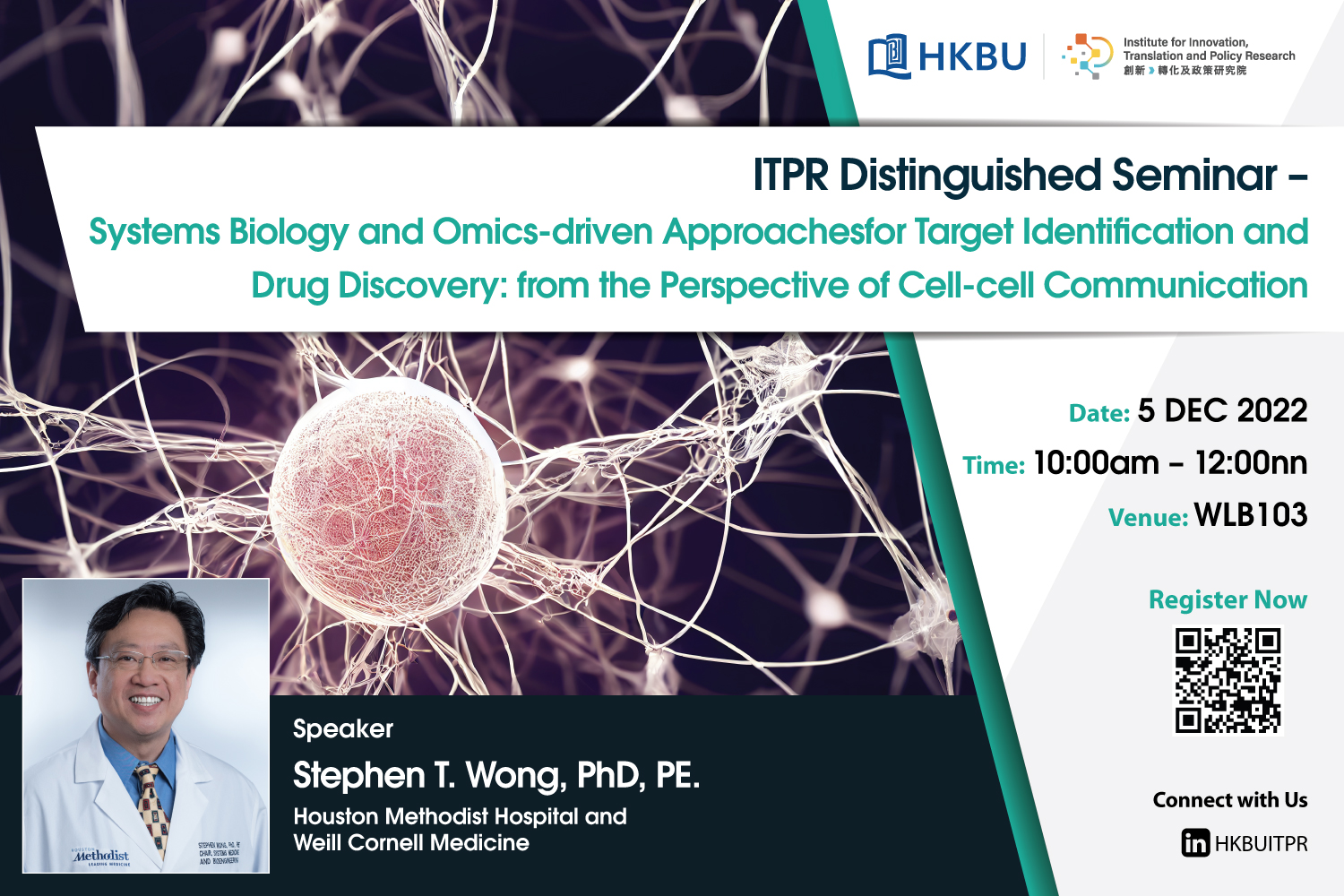最新活动
从细胞间通讯的角度看系统生物学和组学驱动的标靶识别和药物发现方法


日期及时间: 2022年12月5日 早上10时至中午12时
地点:浸会大学逸夫校园永隆银行商学大楼WLB 103室
报名:请于2022年12月2日中午12时前报名
摘要
在过去十年,以生物信息学为基础的科研方式,成为划分细胞组织微环境内细胞间动态、复杂互动的机制,以及发掘新标靶点以作药物重新定位和开发的新动力。 创新、转化及政策研究院(ITPR)于2022年12月5日邀请了来自休斯顿卫理公会医院及威尔康奈尔医学院的Stephen Wong教授以「从细胞间通讯的角度探讨系统生物学和组学驱动的标靶识别和药物开发(Systems Biology and Omics-driven Approaches for Target Identification and Drug Discovery:from the Perspective of Cell-cell Communication)」为题进行演讲。
在浸大暂任首席创新总监刘乐庭教授致欢迎辞后,Stephen Wong教授概述有关多细胞系统生物学策略,如何公平、公正地以特定细胞、单细胞,以及空间转录组学、多重成像和多细胞交互作用模型来了解肿瘤微环境中潜在的细胞间通讯。 他还分享了针对不同器官的肿瘤微环境的应用实例,来说明系统生物学模型在假设生成、肿瘤异质性划分、标靶和药物发现的应用,以及伸延探讨其他疾病如阿尔茨海默氏症和特发性肺纤维化等范畴。 是次的研讨会吸引超过 70 名嘉宾出席,包括浸大校长高级顾问及创新、转化及政策研究院顾问薛永恒先生、理学院副院长(跨学科发展)黄港住教授、Athenex首席执行官兼董事会主席刘耀南博士,以及来自生物学、化学、计算机科学和中医药等学科的研究人员和学生。 研讨会在取得富有成果的讨论并圆满结束。
讲者简介 (只有英文版本)
Stephen T.C. Wong, B.E.E.E. (hons), Ph.D. (Computer Science), P.E. (Electrical Engineering), FIEEE, FAIMBE, FAMIA, FAAIA, is John S. Dunn Sr. Presidential Distinguished Chair, founding Chair of Systems Medicine and Bioengineering Department, Director of the T.T. & W.F. Chao Center for BRAIN and Translational Biophotonics Laboratory, Chief of Medical Physics, and Associate Director of Neal Cancer Center, Houston Methodist Hospital. He is a Professor of Radiology, Neurosciences, Pathology and Laboratory Medicine of Cornell University.
Professor Wong has over three decades of experience in academic medicine and tech industries. He was a Professor at UCSF and Harvard University, handling major medical information and imaging system initiatives, design and implementation at UCSF, Harvard Medical School and Brigham and Women’s Hospital. Stephen has served in leadership roles in major technology-driven companies including HP, Bell Labs, Philips Healthcare, and Charles Schwab, where his group produced an electronic trading platform. His laboratory investigates molecular mechanisms of cancer and neurodegeneration for translation to diagnostics and therapeutics. He received senior executive education from Stanford University, MIT, and Columbia University. He worked in Manila, Perth, Canberra, Singapore, Orlando, Tokyo, Amsterdam, San Francisco, Silicon Valley, Boston, and now Houston. He dedicates the second half of his life in solving disease problems.